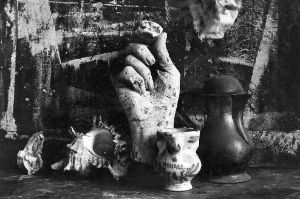Concert
ENDOR
Anna Prohaska | Nicolas Altstaedt | Francesco Corti

Paolo Monti, “Composition Nature morte”, 1950 © Paolo Monti – serie fotografica (Venezia, 1950) – BEIC 6346778, detail, CC BY-SA 4.0
Soprano Anna Prohaska, cellist Nicolas Altstaedt and harpsichordist Francesco Corti have prepared a programme that spans the centuries. Milestones and discoveries of Baroque music are countered by works of the 20th and 21st centuries, including world premieres by Wolfgang Rihm and Jörg Widmann.
The soprano Anna Prohaska, the cellist Nicolas Altstaedt and harpsichordist Francesco Corti are equally at home in the music of the Baroque era as in contemporary music. For the Musikfest Berlin, they developed a programme together that explores themes of linguistic confusion, loneliness, despair, and death: Franz Tunder, main organist at Lübeck’s main church, the Marienkirche, has insightfully set to music the psalm song “An Wasserflüssen Babylon”, whose text recalls the painful experiences of the people of Israel during the Babylonian exile. In his oratorio “Saul”, Georg Friedrich Händel depicts the dramatic conflict between David and Saul and gives voice to the biblically transmitted “Witch of Endor”. Wolfgang Rihm’s latest composition “Gebet der Hexe von Endor”, which will be premiered in this concert, is set in the same context. Also featured are two songs by the English composer John Tavener on verses by the Russian poet Anna Akhmatova, whose late work was strongly influenced by the horrors of the Stalin era, as well as expressive instrumental works for violoncello and harpsichord. The concert concludes with another world premiere: “Sister Death” by Jörg Widmann, a scene from the opera “Babylon”, which explores the limitations and the confusion of language.
Concert Programme
John Tavener (1944 – 2013)
Dante
from: Akhmatova Songs (1993)
for soprano and violoncello
Franz Tunder (1614 – 1667)
An Wasserflüssen Babylon (1645)
for soprano, violoncello and organ
Vincenzo Bonizzi (died 1630)
„Pis ne me peux venir“ (1626)
Passeggiata for violoncello and harpsichord
Georg Friedrich Händel (1685 – 1759)
Vo' far guerra
from: Rinaldo, 2nd act HWV 57 (1711)
for soprano, violoncello and organ
Georg Friedrich Händel (1685 – 1759)
Author of Peace
from: Saul, 2nd act HWV 53 (1738)
for soprano, violoncello and organ
Joseph-Nicolas Scythes-Pancrace Royer (1703 – 1755)
Marche des Scythes
from: Premier livre des pièces de clavecin (1746)
for harpsichord
Alexander Cherepnin (1899 – 1977)
Tartar Dance
from: Songs and Dances (1953)
for violoncello and harpsichord
Luciano Berio (1925 – 2003)
Abbagnata, Ninna Nanna, Ladata
from: Naturale (1985)
for violoncello, organ and tape
Wolfgang Rihm (*1952)
Gebet der Hexe von Endor
from the materials for the play Saul by Botho Strauß
Cantata or soprano and violoncello
Composition commissioned by Berliner Festspiele / Musikfest Berlin
World premiere
John Tavener
Smert (Tod)
from: Akhmatova Songs (1993)
for soprano and violoncello
Georg Friedrich Händel
Infernal Spirits
from: Saul, 3rd act, 2nd scene HWV 53 (1738)
for soprano, violoncello and organ
Marin Marais (1656 – 1728)
Le Tourbillon from: Suite d’Un Goût Étranger (1717)
for violoncello and harpsichord
Georg Friedrich Händel
Credete al Mio Dolore
from: Alcina, 3rd act, 1st scene HWV 34 (1735)
for soprano, violoncello and organ
Heinrich Scheidemann (1596 – 1663)
Pavana Lachrymae d-Moll WV 106
for harpsichord
Jörg Widmann (*1973)
Sister Death
underworld scene from Babylon
adapted for soprano, violoncello and keyboard instruments
Text by Peter Sloterdijk
Composition commissioned by Berliner Festspiele / Musikfest Berlin
World premiere
Cast
Anna Prohaska – soprano
Nicolas Altstaedt – cello
Francesco Corti – organ, harpsichord
A Berliner Festspiele / Musikfest Berlin event